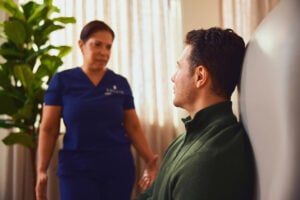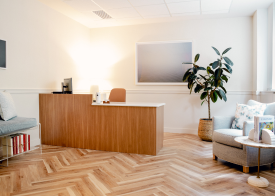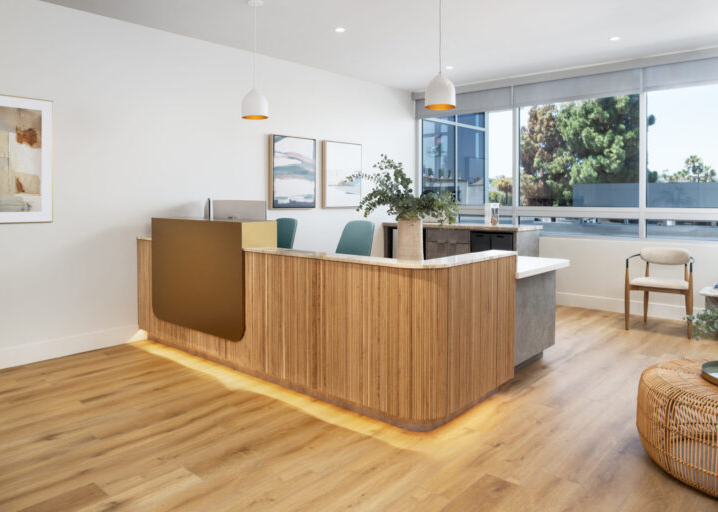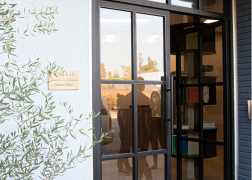When and how did you realize you’re suffering from postpartum?
Let’s define it first: postpartum is a period of time after giving birth that affects all women. It’s not just the first six weeks, three months, or even the first six months. It can last a whole year and beyond. And in this country, specifically, I feel like we’re very ill-prepared for post-natal care. Too often, our only association or understanding of postpartum is postpartum depression, which we need to separate: postpartum depression is not the same as postpartum. What happens is you’ve got a monumental shift in your life physically, which then also affects you emotionally. The sleep deprivation also affects you mentally on every level—it changes your life. So for my postpartum, I had a very, very clear plan. I come from India, and in my culture, it is very, very necessary that the mother is cocooned in love and warmth and lots of care after birth—not just for the newborn, but also care and nutrition and rest for the mother. And not only is it prescribed, in some cultures, they call it the lying in period, wherein you’re almost not allowed to do any kind of heavy work or household chores. You’re also giving your mind a break from the anxiety. So in my case, I had my mother and father with me, who had flown in from India, and I had a postpartum doula, because I wanted to write a different postpartum story for myself, as opposed to all the stories I’d heard from my friends who had challenging months after. In my case, the first three months were very beautiful. It was tough in that there were new challenges—for example, I had never breastfed before, and sleep deprivation was a real thing. But I will say there are so many beautiful hormones raging through your body, which helps you not really feel the side effects of sleep deprivation. It was all just this euphoric feeling, this excitement, this nervousness, and all of it was countered by the care I received, from my mother, my husband, and my postpartum doula.
I think it hit me in month four, when I started to say goodbye to some of my support system. My mom had to go back to India, I was getting out of the situation I had set up for myself in Austin, and I was flying back to Los Angeles, with my child. And so it was going to be a whole new set of help and a whole new kind of experience. And that’s when I really started feeling alone. I had also done the same routine for such a long time: waking up in the middle of the night and feeding every two hours. I was getting ready to go back to work, getting ready to go back outside, embracing physical activity of exercise again, and I think that’s when it really hit me that no matter who you are, no matter how much support you have, no matter what supplements you take… you’re on your postpartum journey. I can say I’ve gone through some really major ups and downs of postpartum from physical pain—like low back pain and really revealing my pelvic floor—to anxiety to overcoming feeling really low and depressed at times and not feeling a sense of purpose. And it’s taken me almost 11 months to cope with that, but that’s where I am today, feeling like I have a better handle on things.
Do you want to add anything with regards to your holistic routine?
Meditation yoga, time to yourself, walks in nature, good nutrition, a good set of healthy supplements, your omegas, vitamin C, vitamin D. All are really, really important. I come from the background of Ayurveda, so for me, it was always warm, healing foods with good fats in it. Foods like avocado and grass-fed butter were key. I’m not saying I was swimming in all of these healthy fats, but I had a fair share in my diet, and continue to, as I’m a breastfeeding mother at 11 months. The reason I specify healthy fats is because a lot of women feel this pressure to bounce back, whether it’s physically or mentally or going back to work, and there is a misconception around healthy fats. They think it would make them put on more weight, which has been debunked by so many studies. I also stayed away from salads, raw foods, juices, and all that stuff that can create havoc in your gut. I focused on yoga and breathing exercises; to reconnect your core to your core, I think pelvic floor therapy and yoga were very crucial. Finding time to yourself, which is so difficult when you have a baby needing you every two hours, is also really important. It’s important to have a firm plan with your support system, whether that’s your husband, mother, postpartum doula, whoever’s around you to help—the baby’s other caregivers. If you have the option, create a plan for yourself where you take time to yourself and be with your thoughts, even alone with your cup of tea and, and just cry it out. When I got overwhelmed and took that time to focus more on baby stuff than my own, that’s when I really started feeling low because I was unable to take any time off for myself.
"Postpartum is not just the first six weeks. It can last a year and beyond. It hit me in month four, when I started to say goodbye to some of my support system. That's when I really started feeling alone.”
In what ways has coping with it affected your life, from your career to your fertility to your emotional wellbeing?
Well, it’s been a journey, and it wasn’t overnight. In your journey to cope with all the changes that happen in your life, be kind to yourself, and be very patient with yourself. Anyone around you who expects you to master motherhood overnight—they are not your support system. Speak to another mother who’s been through this journey. Speak to your therapist too, so you can get their empathy and understanding. Please do not expect miracles! The time I’ve taken to understand that has taught me a lot about motherhood and helped me be aware of myself and check in with my own anxieties so I can counter them early on. Emotionally, I feel it has really helped me sleep better, connect with my partner better, and connect with my family and friends better.
By the way, once you get sleep, once your baby sleeps for longer stretches, and you are sleeping for longer stretches, it completely changes. That is almost like an overnight change within a week, and you will feel such a difference. Being able to find ways where you can really prioritize your sleep, or take daytime naps or whatever you can squeeze in—that’s super important and has really helped me get back to my work as well. As for the haze you feel in the first year of motherhood—the cloudiness—it’s very normal. So don’t be too hard on yourself if that doesn’t go away, no matter what you do. Even the little bit of focused care you take will really start giving you that clarity and focus to cope with your day-to-day. Emotionally, it’s obviously made me feel less lonely and less like I didn’t have a grip on things. I now understand what I’m here to do: I’m here to be a career woman, to be a mother, to be a friend and a sister and a wife and I can do all of it. But I can only do it if I take care of myself first.
And do you feel you’ve been seen and heard by your doctors during this time?
Medically there’s only one check-up that a woman gets postpartum after she’s had a baby, which is at the six week mark, and then the next one is at the one year mark or nine month mark or a one year mark. In any case, that is not enough. And that is a system that needs to be changed—in modern science and in western medicine as well. I’ve had a group of doctors, not necessarily my OBGYNs, but a group of other doctors and friends who are doctors, and certainly naturopathic doctors, who’ve really been there for me. But there’s a lot of work to be done there and we need to reinvest in how we understand what it is for a mother to be in the postpartum journey.
“We think that after childbirth, a woman's body just closes up and heals itself. The postpartum journey is so misunderstood—with so many unrealistic expectations—which makes the healing process so much harder and more isolated for the woman.”
What is the biggest misconception about childbirth? And is there anything you wish you could help people better understand?
We think that after childbirth, a woman’s body just closes up and heals itself. Like we’re just back to normal, summing up much of the misconceptions and confusion around birth. The postpartum journey truly is so misunderstood, with so many unrealistic expectations around it, which just makes the healing process so much harder and more isolated for the woman.
Considering how difficult postpartum can be and that it affects half of the world’s population, why do you think so many women feel shame about it?
The reason why we feel shame is because of the pressures and expectations laid upon us—by society, the media, workplaces, and even the medical system itself. It’s a huge, uphill battle for all of us to overcome. It’s because a new mother is unable to kind of recover magically. I don’t know how anyone recovers magically in a six week period. She just has to go back to work because there is no more paid leave after that. Women just stop talking about it, because they feel it could cost them their job, which will cost them their livelihood, or will sound like they’re constantly complaining. Frankly, the word is not complaining, the word is expressing and they’re unable to even express how they’re feeling in that moment because it’s labeled as erratic or hormonal. Of course it’s hormonal! Why shouldn’t you say you’re feeling hormonal when you’re completely ridden by new hormones right now that you have no control over? Even the negative connotation that goes around the word hormonal needs to be rethought. The shame is from being asked to not talk about it for such a long time, constantly hearing, All women go through it. Your grandparents, your grandmother, and your great grandmother went through it. So what if they went through it and were not allowed to talk about it? Now it’s time to talk about it.
If there has been any silver lining to having this experience, what would you say it is?
I think now that I’ve had this experience, I can understand what other women have said in the past better, and use my platform to be an even louder spokesperson for it. Through my pregnancy, I came on board as a Chief Impact Officer for a brand called Anya, which focuses on the postpartum journey. Of course, I had an experience that was positive and came with a lot of information and research. And hopefully that can be made easier and simpler for other people and more digestible to consume—not just for women, but also their partners and caregivers and family members, and maybe at some point doctors too. The advice I’m sharing is truly my story and stories are so important to hear because how else do we learn to empathize and be better at our own jobs? As a mother, doctor and even doula.
What about Sollis Health have you found to be the most useful?
While I was in my postpartum, I also got COVID, and got very ill. There were so many questions I had because I was still breastfeeding and recovering physically from so many things postpartum put me through. During that time, I had so many questions about contraindications, and medicines, and also just needing someone to hear me out on how I was feeling and how scared I was about my breast milk supply plummeting. I called the doctors at Sollis, and felt very heard. They were really there for me through this experience. They assured me they saw many women go through COVID during the pregnancy and postpartum periods, and were able to share their experiences and advise me. I felt like I was not alone. So much of medicine is taking care of patients, making them feel heard and seen, making them feel not so isolated. They were also up to date on the latest research and able to offer me a variety of medical routes. So it was a very wholesome kind of experience with Sollis. I’m so grateful I have the service available to me.
Any good words to live by?
Everything will be just fine. Go with the flow and everything will be just fine.







